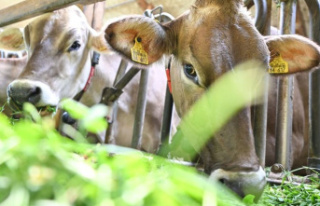A dip in the cool water provides refreshment in the heat. But the lakes and rivers in Bavaria are not that cold anymore. What frostbite loves is a problem for the fish.
Munich (dpa / lby) - The fish in the Bavarian rivers and streams are also suffering from the heat and drought. Especially cold-loving species such as trout, grayling and huchen are affected, said fishing ecologist Sebastian Hanfland from the Bavarian State Fishing Association in Munich. "When the temperatures are above 20 degrees, it becomes critical." Many bodies of water have already reached this value. "It's still possible. But if the heat continues, it can become dramatic."
According to the expert, when water temperatures rise, fish need more oxygen. But its content decreases with warming. "The fish are more susceptible to disease. They stop eating and go into hibernation." But especially when it is hot, many people are out and about in and on the water because they are looking for cooling. This is additional stress for the already weakened fish.
In the Main, the high temperatures are not yet affecting the fish and small creatures. "The oxygen supply is still very good," said water ecologist Eva-Barbara Meidl from the water management of the Lower Franconia government. The experts are now monitoring the situation closely. This is checked finely several times a day, said Meidl. If the critical 25-degree mark is exceeded, an alarm plan takes effect. The experts are more worried about the water level at the moment. "We rarely had so little water in the Main," said Meidl.
The district of Ansbach now advises against taking water from ponds, streams and ditches because of the low water levels. "Fish, small creatures and aquatic plants suffer from rising water temperatures and the reduced oxygen content," says the reasoning.
In the lakes, the fish usually do better when it is hot, although these also warm up. Fish such as pike, carp and catfish lived there, said Hanfland. "They tolerate higher temperatures." However, it becomes problematic when there are many fish in a pond or lake, since they need more oxygen when it is warmer, but the concentration in the water drops.
When water temperatures rise, fish tend to congregate in rivers where cooler springs flow. Some of the fishing clubs then blocked them for fishing so that the fish could get the rest they needed, said Hanfland. Of necessity, bathing and boating would also have to be restricted there. "But this is still in its infancy. In the course of global warming, we will have to deal more with it and draw up emergency plans."
For this reason, the renaturation of the water bodies in Bavaria is also very important. "Then the fish find cooler places to retreat," said Hanfland. However, their path is often blocked by weirs and hydroelectric power plants, because there are not fish bypasses everywhere.












